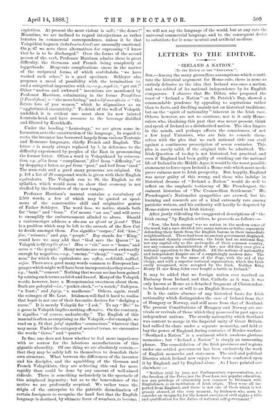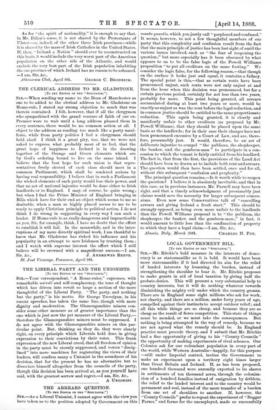LETTERS TO THE EDITOR.
" IRELAND A NATION."
[To THE EDITOR OF THE "SPECTATOR."] SIE,—Among the many groundless assumptions which consti- tute the historical argument for Home-rule, there is none so
entirely delusive as the idea that Ireland was once a nation, and was robbed of its national independence by its English conquerors. I observe that Mr. Dillon, who proposed the toast of " Ireland a Nation " on St. Patrick's Day, showed a commendable prudence by appealing to aspirations rather than to facts, and dwelling mainly not on historical traditions, but on the " spirit of nationality " inherent in the Irish race.
Others, however, are not so cautious ; nor is it only Home- rulers who, idealising this past that was never present, think and speak of Ireland as a disinherited nation. The idea lingers in the minds, and perhaps affects the consciences, of not a few loyal Unionists, who are fain to console them- selves with the plea that no such national title can avail against a continuous prescription of seven centuries. This plea is surely valid, if the original title be admitted. The Irish Question of to-day is not historical, but practical, and even if England had been guilty of crushing out the national life of Ireland in the Middle Ages, it would be the worst possible atonement to force upon Ireland a Home-rule which must needs prove ruinous now to Irish prosperity. But, happily, England was never guilty of this wrong, and those who indulge in historical dreams of " Ireland a Nation " would do well to reflect on the emphatic testimony of Mr. Prendergast, the eminent historian of " The Cromwellian Settlement." Mr. Prendergast's Nationalist sympathies are avowed, but his learning and research are of a kind extremely rare among patriotic writers, and his authority will hardly be disputed by Home-rulers versed in Irish history.
After justly ridiculing the exaggerated descriptions of "the Irish enemy " by English settlers, he proceeds as follows :—
" Now, 'the Irish enemy' was no nation in the modern sense of the word, but a race divided into many nations or tribes, separately defending their lands from the English barons in their immediate neighbourhood. There had been no ancient government displaced, no national dynasty overthrown : the Irish had no national flag, nor any capital city as the metropolis of their common country, nor any common administration of law ; nor did they ever give a national opposition to the English. All the notions of nationality and independent Empire are of a surprisingly modern date. The English coming in the name of the Pope, with the aid of the clergy, and with a superior national organisation, which the Irish easily recognised, were accepted by the Irish. Neither King Henry II. nor King John ever fought a battle in Ireland."
It may be added that no foreign nation ever received an Embassy from Ireland, and that, Catholic as it was, it was only known at Rome as a detached fragment of Christendom, to be handed over at will to an English Sovereign.
It is the entire absence of any historical basis for Irish nationality which distinguishes the case of Ireland from that of Hungary or Norway, and still more from that of Scotland. The present Constitutions of Hungary and Norway are sur- vivals or revivals of those which they possessed in past ages as independent nations. The sturdy nationality which Scotland was content to merge in the Imperial unity of Great Britain, had rallied its clans under a separate monarchy, and held at
bay the power of England during centuries of Border-warfare. "Scotland a Nation" is a sentiment which awakens glorious
memories ; but " Ireland a Nation " is simply an unmeaning phrase. The consolidation of the Irish provinces and regions under one settled government has been exclusively the work of English monarchs and statesmen. The civil and political liberties which Ireland now enjoys have been conferred upon it by England, and by England alone. As I have pointed out elsewhere :-
"Neither trial by jury, nor Parliamentary representation, nor the freedom of the Press, nor the Poor-Law, nor popular education, nor any privilege of citizenship now common to Irishmen with Englishmen, is an institution of Irish origin. They were all im- ported from England, and there is not one of them which is not grossly abused, at this very moment, by Irishmen who seem to consider an incapacity for the honest exercise of civil rights a title and qualification for the duties of national self-government."
As for "the spirit of nationality," it is enough to say that, in Mr. Dillon's sense, it is not shared by the Protestants of Ulster—or, indeed, of the other three Irish provinces—while it is shared by the mass of Irish Catholics in the United States. If, then, " Ireland a Nation " should ever be reconstructed on this basis, it would include the very worst part of the American population on the other side of the Atlantic, and would exclude the very best part of the Irish population inhabiting the one province of which Ireland has no reason to be ashamed. —I am, Sir, &c.,



































 Previous page
Previous page